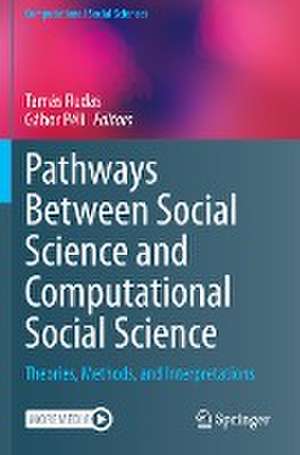Pathways Between Social Science and Computational Social Science: Theories, Methods, and Interpretations: Computational Social Sciences
Editat de Tamás Rudas, Gábor Pélien Limba Engleză Paperback – 23 ian 2022
| Toate formatele și edițiile | Preț | Express |
|---|---|---|
| Paperback (1) | 487.75 lei 6-8 săpt. | |
| Springer International Publishing – 23 ian 2022 | 487.75 lei 6-8 săpt. | |
| Hardback (1) | 590.16 lei 6-8 săpt. | |
| Springer International Publishing – 23 ian 2021 | 590.16 lei 6-8 săpt. |
Din seria Computational Social Sciences
- 15%
 Preț: 649.39 lei
Preț: 649.39 lei - 18%
 Preț: 964.54 lei
Preț: 964.54 lei - 15%
 Preț: 643.34 lei
Preț: 643.34 lei - 15%
 Preț: 640.88 lei
Preț: 640.88 lei - 20%
 Preț: 338.16 lei
Preț: 338.16 lei -
 Preț: 390.63 lei
Preț: 390.63 lei -
 Preț: 395.47 lei
Preț: 395.47 lei - 20%
 Preț: 662.11 lei
Preț: 662.11 lei - 20%
 Preț: 618.05 lei
Preț: 618.05 lei - 20%
 Preț: 760.97 lei
Preț: 760.97 lei - 20%
 Preț: 628.79 lei
Preț: 628.79 lei - 20%
 Preț: 649.93 lei
Preț: 649.93 lei - 20%
 Preț: 761.44 lei
Preț: 761.44 lei - 15%
 Preț: 643.48 lei
Preț: 643.48 lei - 18%
 Preț: 1117.34 lei
Preț: 1117.34 lei - 20%
 Preț: 1169.47 lei
Preț: 1169.47 lei -
 Preț: 432.12 lei
Preț: 432.12 lei -
 Preț: 393.13 lei
Preț: 393.13 lei - 18%
 Preț: 887.38 lei
Preț: 887.38 lei -
 Preț: 383.93 lei
Preț: 383.93 lei - 20%
 Preț: 241.67 lei
Preț: 241.67 lei - 15%
 Preț: 523.07 lei
Preț: 523.07 lei -
 Preț: 428.07 lei
Preț: 428.07 lei - 15%
 Preț: 693.06 lei
Preț: 693.06 lei - 20%
 Preț: 1166.19 lei
Preț: 1166.19 lei - 15%
 Preț: 696.02 lei
Preț: 696.02 lei - 20%
 Preț: 1156.62 lei
Preț: 1156.62 lei - 25%
 Preț: 470.31 lei
Preț: 470.31 lei
Preț: 487.75 lei
Nou
Puncte Express: 732
Preț estimativ în valută:
93.33€ • 97.71$ • 77.22£
93.33€ • 97.71$ • 77.22£
Carte tipărită la comandă
Livrare economică 05-19 aprilie
Preluare comenzi: 021 569.72.76
Specificații
ISBN-13: 9783030549381
ISBN-10: 3030549380
Pagini: 275
Ilustrații: XVII, 275 p. 60 illus., 36 illus. in color.
Dimensiuni: 155 x 235 x 24 mm
Greutate: 0.42 kg
Ediția:1st ed. 2021
Editura: Springer International Publishing
Colecția Springer
Seria Computational Social Sciences
Locul publicării:Cham, Switzerland
ISBN-10: 3030549380
Pagini: 275
Ilustrații: XVII, 275 p. 60 illus., 36 illus. in color.
Dimensiuni: 155 x 235 x 24 mm
Greutate: 0.42 kg
Ediția:1st ed. 2021
Editura: Springer International Publishing
Colecția Springer
Seria Computational Social Sciences
Locul publicării:Cham, Switzerland
Cuprins
Introduction.- Theory: Dilemmas of Model Building and Interpretation.- Methodological Toolsets.- New Look on Old Issues: Research Domains Revisited by Computational Social Science.- Epilogue.
Notă biografică
Gábor L. Péli is a senior researcher at the Centre for Social Sciences, Hungarian Academy of Sciences Centre for Excellence and professor of sociology at the Károli Gáspár University of the Reformed Church in Hungary. His research interests are in the logical analysis of organizational discourse and behavior along with network approaches to organizations.
Textul de pe ultima copertă
This volume shows that the emergence of computational social science (CSS) is an endogenous response to problems from within the social sciences and not exogeneous. The three parts of the volume address various pathways along which CSS has been developing from and interacting with existing research frameworks. The first part exemplifies how new theoretical models and approaches on which CSS research is based arise from theories of social science. The second part is about methodological advances facilitated by CSS-related techniques. The third part illustrates the contribution of CSS to traditional social science topics, further attesting to the embedded nature of CSS. The expected readership of the volume includes researchers with a traditional social science background who wish to approach CSS, experts in CSS looking for substantive links to more traditional social science theories, methods and topics, and finally, students working in both fields.
Caracteristici
Demonstrates theoretical, methodological and topical pathways between traditional and computational social science Uses these pathways to improve the interpretative power of traditional social science Provides novel practical examples as to how traditional social scientists might approach computational social science
